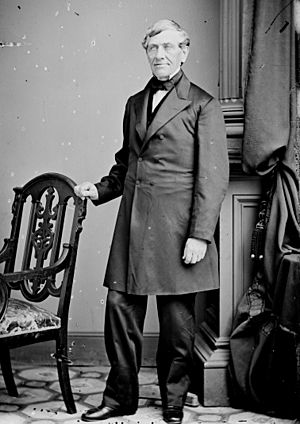Augustus Bradford facts for kids
Quick facts for kids
Augustus Williamson Bradford
|
|
|---|---|
 |
|
| 32nd Governor of Maryland | |
| In office January 8, 1862 – January 10, 1866 |
|
| Lieutenant | Christopher C. Cox |
| Preceded by | Thomas H. Hicks |
| Succeeded by | Thomas Swann |
| Surveyor of Customs for the Port of Baltimore | |
| In office April 16, 1867 – April 12, 1869 |
|
| Preceded by | Robert Cathcart |
| Succeeded by | Edlington Fulton |
| Clerk of the Court for Baltimore County, Maryland | |
| In office 1851–1857 |
|
| Preceded by | Thomas Kell |
| Succeeded by | Henry M. Fitzhugh |
| Personal details | |
| Born | January 9, 1806 Bel Air, Maryland, U.S. |
| Died | March 1, 1881 (aged 75) Baltimore, Maryland, U.S. |
| Political party | Whig (1845–1854) American Party (1854–1861) Union (1861–1866) Democratic (1866–1872) |
| Spouse | Elizabeth Kell Bradford (m. 1835-1881, his death) |
| Children | 12 |
| Education | St. Mary's College |
| Profession | Attorney |
| Signature |  |
Augustus Williamson Bradford (January 9, 1806 – March 1, 1881) was the 32nd Governor of Maryland. He served from 1862 to 1866, during the Civil War. Governor Bradford was a strong supporter of the Union (the northern states) during this difficult time.
Contents
Early Life and Career
Augustus Williamson Bradford was born in Bel Air, Maryland, on January 9, 1806. His parents were Samuel Bradford and Jane Bond. He went to St. Mary's College and graduated in 1824.
After college, he studied law and became a lawyer in 1826. He later moved to Baltimore and lived there for the rest of his life. In 1835, he married Elizabeth Kell. They had twelve children together.
In 1845, Governor Thomas Pratt chose Bradford to be the Clerk of the Baltimore County Court. He held this job until 1851.
Governor During the Civil War
In February 1861, Governor Thomas H. Hicks asked Bradford to represent Maryland. Bradford attended the Washington Peace Conference. At this meeting, he gave a speech showing his support for the Union.
Because of his strong Union support, the Union Party chose him to run for governor. He won the election by a large number of votes. Bradford became governor on January 8, 1862.
Standing Up for Maryland
During his time as governor, Bradford strongly disagreed with the federal government's actions. He felt they interfered too much in Maryland's elections. He also spoke out against the strict military control in the state.
Even though he disagreed with some methods, he worked hard to keep Maryland in the Union. He also supported the federal government's overall authority. In September 1862, he joined other northern governors at a meeting in Pennsylvania. This meeting was called the Loyal War Governors' Conference.
Facing Confederate Attacks
During the Civil War, Confederate soldiers invaded Maryland three times. In July 1864, during one of these invasions, Confederate raiders attacked Bradford's home. They burned his house to the ground. All his furniture, books, and papers were destroyed.
This attack was partly in revenge for a Union general burning a Virginia governor's home. It was also because Bradford was a very strong supporter of the Union.
Important Changes in Maryland
As governor, Augustus Bradford made several important decisions. He released Samuel Green (freedman) from jail. Green was an African-American minister who was jailed for having a copy of Uncle Tom's Cabin. Bradford let him go, but Green had to leave the state.
Bradford also encouraged people to move to Maryland, especially after slavery was ended. He supported creating a statewide school system. He also helped reorganize the state's military. He played a role in buying part of the Gettysburg battlefield for a cemetery for Union soldiers.
In 1864, Maryland created a new state constitution. This new constitution ended slavery in Maryland. It also took away the right to vote from anyone who fought for or helped the Confederacy. Governor Bradford worked hard to get this constitution approved. However, it was only passed because soldiers voted for it. This constitution did not work well and was replaced just three years later.
Bradford did not like the federal government's plan to let enslaved people join the Union Army. He felt that their owners should be paid first.
After Being Governor
After his term as governor ended, President Andrew Johnson appointed Bradford to a new role. He became the Surveyor of the Port of Baltimore. He held this job until April 1869.
Around 1872, he joined the Democratic Party. He was chosen as an elector for Horace Greeley in the presidential election that year.
Augustus Williamson Bradford retired in 1869. He passed away in Baltimore on March 1, 1881. His funeral was held at the Mount Vernon M.E. Church. He was buried in Greenmount Cemetery in Baltimore, Maryland.
See Also
Images for kids
 | William M. Jackson |
 | Juan E. Gilbert |
 | Neil deGrasse Tyson |


